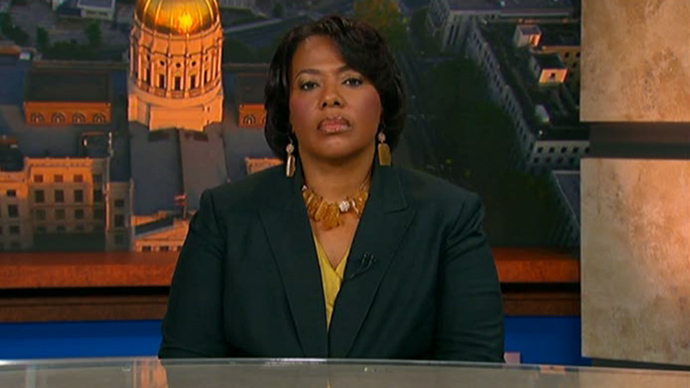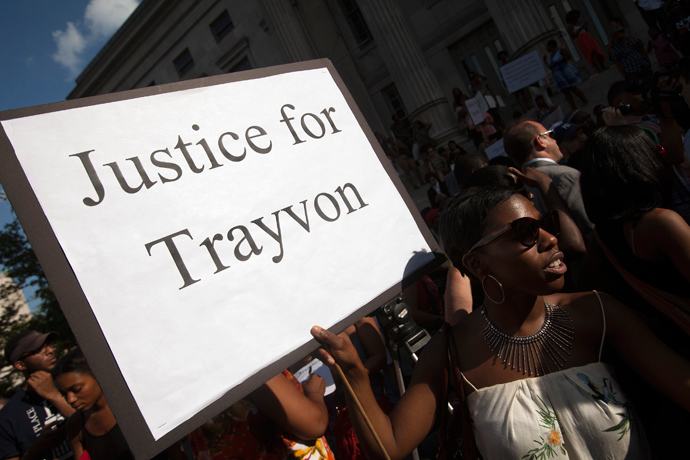Martin Luther King Jr.’s daughter: Zimmerman case a wake-up call to finish MLK’s work

The daughter of Martin Luther King Jr., Bernice King, believes the Zimmerman case shows that racial discrimination is still prominent in the US.
King is one of the most prominent civil rights leaders of the 20th century and the CEO of the Martin Luther King Jr. Center for Nonviolent Social Change.
Only an open dialogue discussing the issues of race, prejudice, and discrimination will help irradiate the fear that still exists between different races around the world and allow humans to live and connect as one race, King told RT.
RT:How do you feel about George Zimmerman walking free from court?
Bernice King: Well, of course I was extremely disappointed and heartbroken that he did walk out. I was thinking that maybe there would have been a manslaughter conviction at least. And so it’s just evidence that we still have a lot of work to do in terms of our laws in the United States of America. I believe the jury did the best that they could do with what they were given, but in many regards this case was not prosecuted right, in my personal opinion.
RT:You’re saying the lawyers did their best given the circumstances, but many argue that the ruling highlights US racial profiling. Do you agree?
BK: Well it depends on how you look at it. When you think about the fact that had this been a white American, a white young man, I doubt very seriously whether George Zimmerman would have reacted so swiftly in the situation. I think he probably would have thought about it twice because the fact of the matter is, in America we all know, it’s almost like a secret code that there are certain people you have to be careful with and there are other people that the value of their life is not the same, and so I believe that it could have been a racial profiling situation just by some of the language that George Zimmerman was using on the 911 call, things of that nature.

RT:How do you think a case like this would have been dealt with when Martin Luther King Jr. was alive? Do you think much has changed since then?
BK: If you narrow it down to this particular case, then I would say perhaps not in terms of nothing being changed. But a lot of things have changed in America, so we can’t say nothing has changed. I just think we are still continuing with unjust laws that disproportionately affect African Americans and African American males more than any other group of people in America. These kinds of issues were very prevalent in my father’s time – often times you would have all white juries. In this case it was mostly white and one Hispanic and there’s a black victim in this case. And what I mean by “victim” is the one that ends up dead. Nine times out of ten, back in the 60’s - or should I say ten times out of ten - that person would have walked just as George Zimmerman walked in this particular situation.
RT:You were suggesting a moment or two ago that there are numerous ethnic groups living across the United States. Is it possible though that it’s just the African American population that feels oppressed?
BK: Well I think a lot of groups in America feel oppressed. I think those of us from an African American community [feel oppressed] because we’ve had such a long history of oppression since we’ve been in this country. It makes it a little bit more intense. And when we look at the statistics in a lot of categories in America - whether we’re talking about the criminal justice system, education, health care, or jobs wealth - there are great disparities still as it relates to the African American community. And so this particular case, I think to me, is a sign and a wakeup call that we have to finish - or continue the unfinished work - of Martin Luther King Jr. I think that is perhaps why ironically, we have the name Trayvon “Martin” - not that he is Martin Luther King Jr., but I think it’s kind of a sign that [there is] reason to connect with and continue this unfinished work of Martin Luther King Jr., particularly in the racial and economic areas.

RT:Your father, Martin Luther King Jr., obviously brought massive changes into the system back in the 1960’s. Through nonviolent disobedience, he successfully fought the United States segregation policies. What do you think now needs to be done to eradicate what many say is racial injustice in the country? What can be done do you think?
BK: I think we all have to start personally, individually, in our own homes and in our own hearts. My father taught the power of unconditional love and non-violence and seeing people as part of the human race - not just black or white or Asian or Latino - but as a part of the human race. And we have to find a way - not just in this nation but in this world - to see ourselves as interconnected and interrelated, and find a way to live together as brothers and sisters - or as my father said, “perish together as fools.” And one of the best ways to do that is we have to have more dialogue and discussion and it has to be honest dialogue and discussion and we have to remove a lot of the hate and hostility in the process and really talk about the different perspectives and feelings that people have as it relates to race because we have to get to the bottom of it. We continue to brush it under a rug, but we have to talk about it. We have to establish friendships and understanding and reach across and connect with people in different communities because oftentimes, people fear each other because they don’t connect with one another. And so one of the first steps is that we have these meetings and dialogues - these conversations - where we begin to connect more. And secondly, we have to have a serious look into the systematic and institutional structures of America that may continue to perpetuate some of the vestiges of slavery and segregation and racism in our society.
The statements, views and opinions expressed in this column are solely those of the author and do not necessarily represent those of RT.












